Aspiration for better digital experiences is never the problem but buy-in and execution can be.
Aspiration for better digital experiences is never the problem but buy-in and execution can be. Faced with rising digital expectations, B2B marketers and their IT colleagues know something must be done but often have too many internal roadblocks to get there.
Episerver recently surveyed 700 global B2B decision-makers and has provided insights into what professionals want to do today, tomorrow and in the future to fix the customer-centricity gap between what their customers want and what they actually deliver.

Digital experience today
A large percentage of marketers and technology professionals say their website delivers an exceptional customer experience and follows industry best practices. According to Episerver’s research, 86% of professionals surveyed said they deliver industry-leading websites and 84% said they deliver exceptional customer experiences online.
This confidence reverses, however, when marketers and technology professionals were asked about their internal weaknesses. Specifically, marketing professionals were more likely than their IT peers to admit their websites delivered poor digital experiences for their customers, partners, and salesforce.
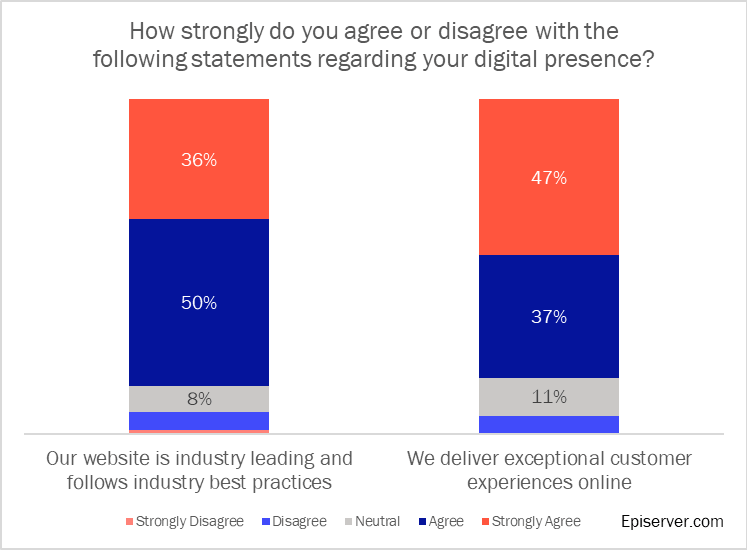
Further to this, marketing professionals call out internal culture as a weakness, more so than their IT peers.
- 6% of marketing professionals agree or strongly agree that there is cultural resistance to the adoption of digital technologies.
- 40% of technology professionals disagreed or strongly disagreed that there is cultural resistance to the adoption of digital technologies.
Marketing professionals say they lack funding to pull of digital transformation whereas technology professionals disagreed.
- 60% of marketing professionals agree or strongly agree that they lack funding from senior executives to execute digital transformation projects.
- 48% of technology professionals disagreed or strongly disagreed they lack funding from senior executives to execute digital transformation projects.
Marketing professionals say they deliver poor digital experiences, technology professionals disagreed.
- 54% of marketing professionals agree or strongly agree they deliver a poor digital experience for their customers, partners and sales team.
- 56% of technology professionals disagreed or strongly disagreed they deliver a poor digital experience for their customers, partners and sales team.
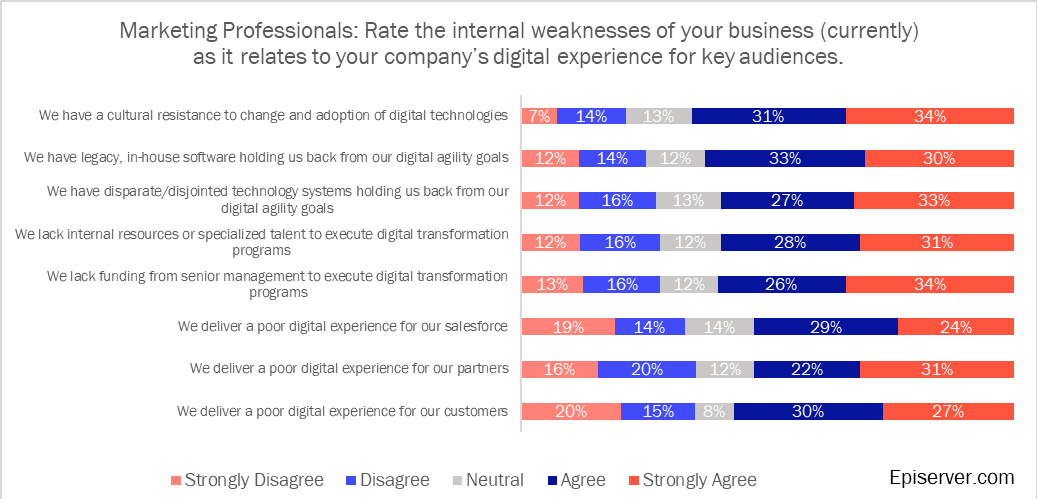
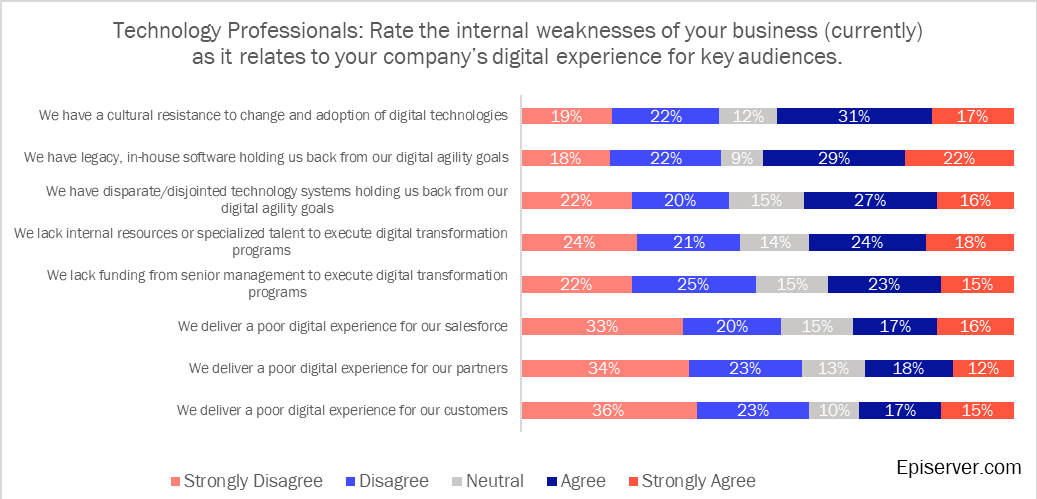
Digital experience tomorrow
When asked about external threats to their business, marketing and technology professionals were concerned about many areas. From digitally native startups to increasing costs, almost 50% of respondents agreed or strongly agreed the following threats would be faced in the next three years:
- Digitally native startups.
- Increasing cost to acquire new customers.
- Channel conflict will prevent them from selling online.
- Increasing digital expectations of our customers or partners.
- Being outspent by our competitors on digital technologies.
Both marketing and technology professionals saw increasing digital expectations of their customers and partners as threats (48%, 47% strongly agree respectively). This indicates changing customer expectations for digital tools is the largest concern for both marketing and IT professionals. Competitors may innovate and costs may increase, but the ever-increasing and ever-evolving digital expectations of customers and partners seem to be the most threatening to these groups.
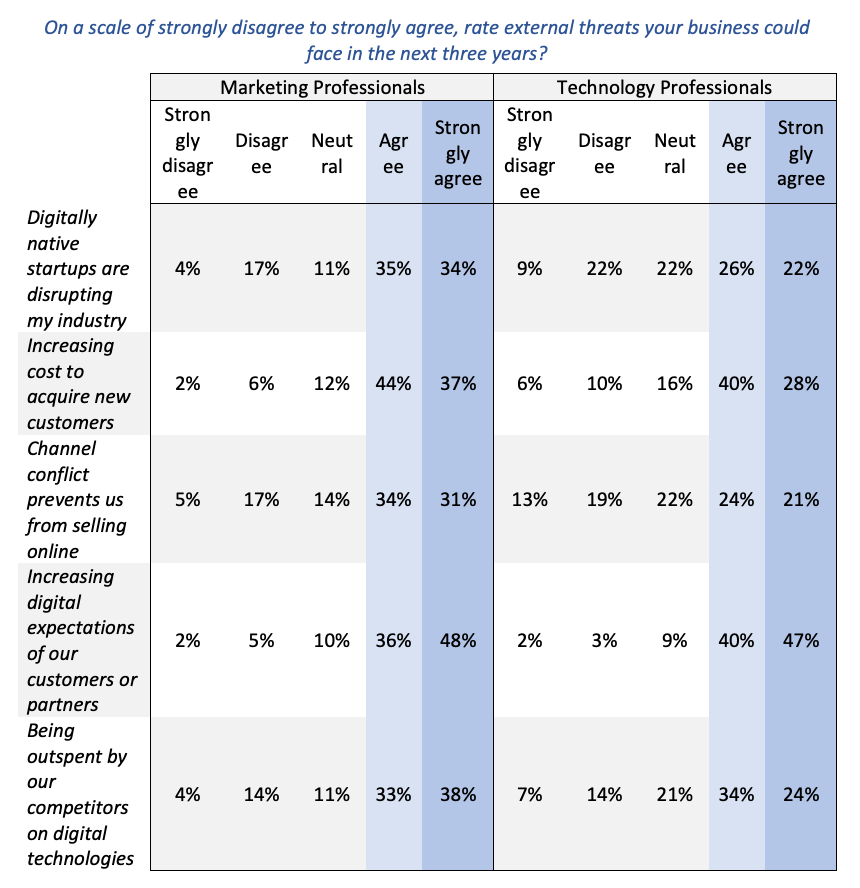
Marketing professionals were particularly sensitive to being outspent by competitors (71% agree/strongly agree) and facing digitally native startups disrupting their industry (69% agree/strongly agree). Technology professionals were more neutral or disagreed with these threats but still acknowledged them as real.
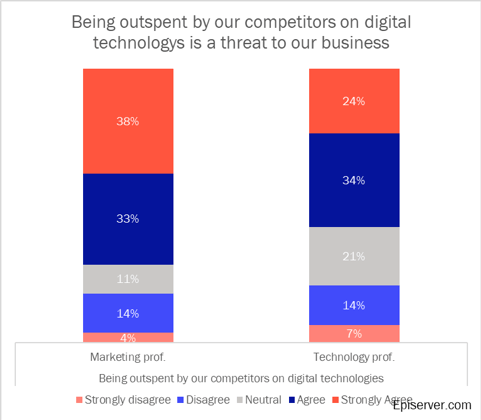
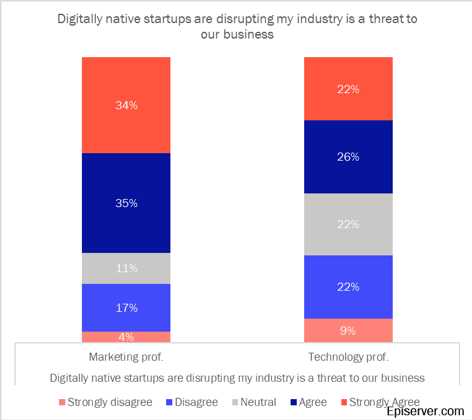
Digital experience of 2022
How do they think they will respond to these threats? Improving online customer experience, equipping their salesforce with digital tools, and selling direct to end customers rank are the biggest opportunities over the next three years.
When asked “What are the most significant opportunities for your business in the next three years?” marketing professionals and technology professionals agree:
- Improving online customer experience (17%)
- providing digital selling tools to their salesforce (13%)
- and selling direct to customers online (13%) are top priorities
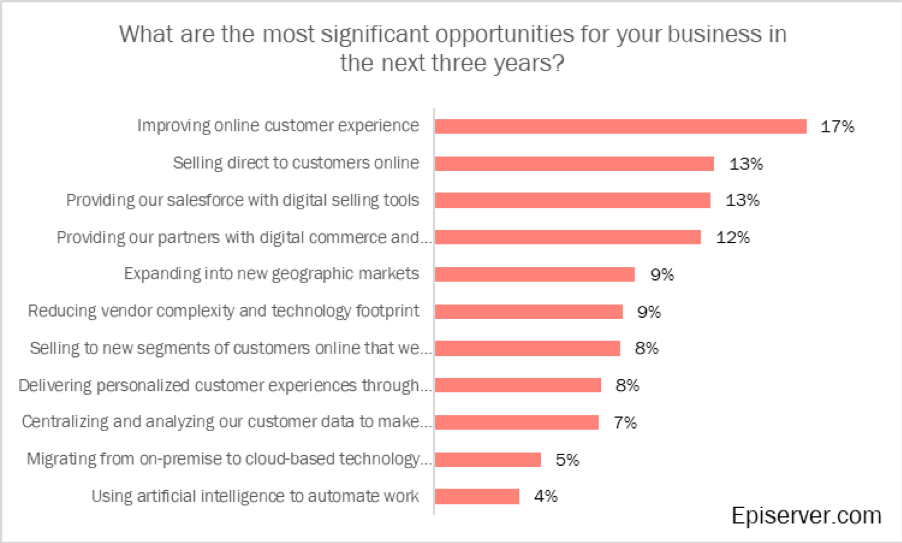
However, within their peer group, both marketing and technology professionals have slightly different secondary and tertiary goals.
Some 57% of technology professionals said improving online customer experience was a top-three opportunity; this is a generic statement that may have served as a ‘catch-all’ for IT leaders.
Marketing professional took are more nuanced approach with some marketing professionals reporting that reducing vendor complexity (28%), selling to new segments online profitably (27%) and delivering personalized experiences (26%) were top-three priorities. These opportunities drew more responses from marketers than technologists.
Technologists did stand out in three other areas compared to marketers. Some 19% of technologists said migrating from on-premise to cloud-based technologies was a top-three opportunity (compared to 9% of marketers). Technologists were also slightly more optimistic about expanding into new geographic markets (30% compared to 23%) and 26% of technologists said that centralizing and analyzing customer data was a top-three opportunity (compared to 18% of marketers).
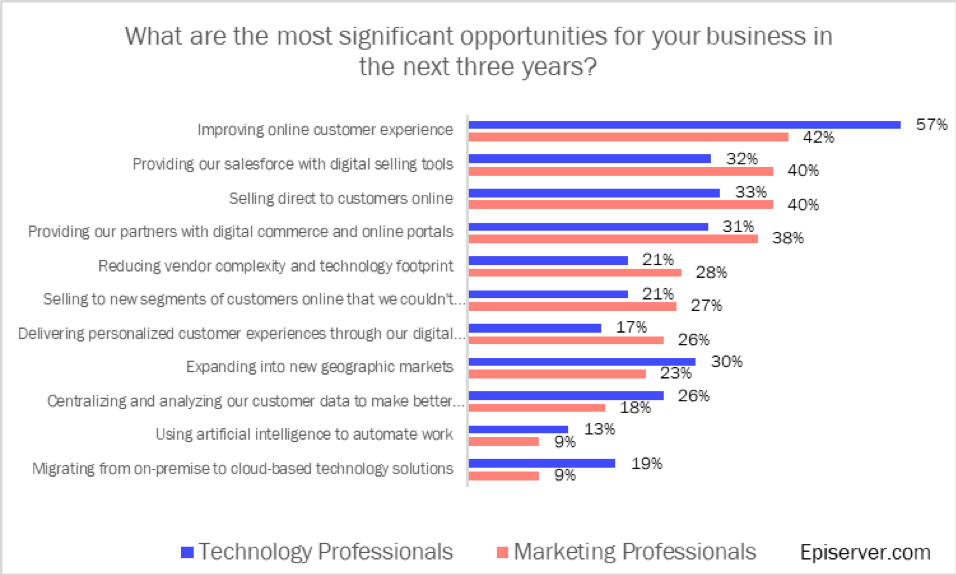
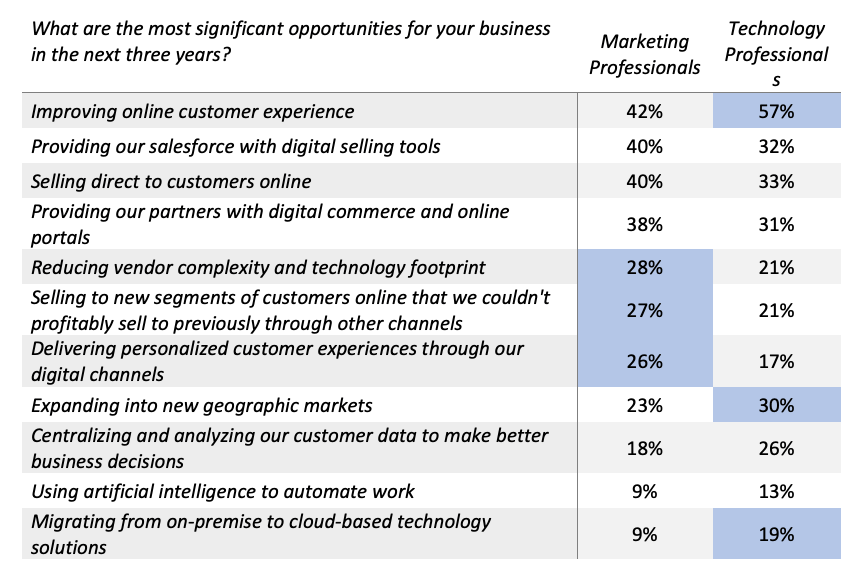
Marketing and technology professionals were consistent when asked about investment plans, focusing on analytics, email marketing and ecommerce to realize these opportunities.
- 59% of technology professionals said web analytics was a top-three likely investment compared to 49% of marketing professionals.
- Email marketing systems took a larger share of the top three likely investments for marketing professionals (47%) compared to only 29% of technology professionals.
- Both marketing and technology professionals agreed that ecommerce platforms were a top-three priority.
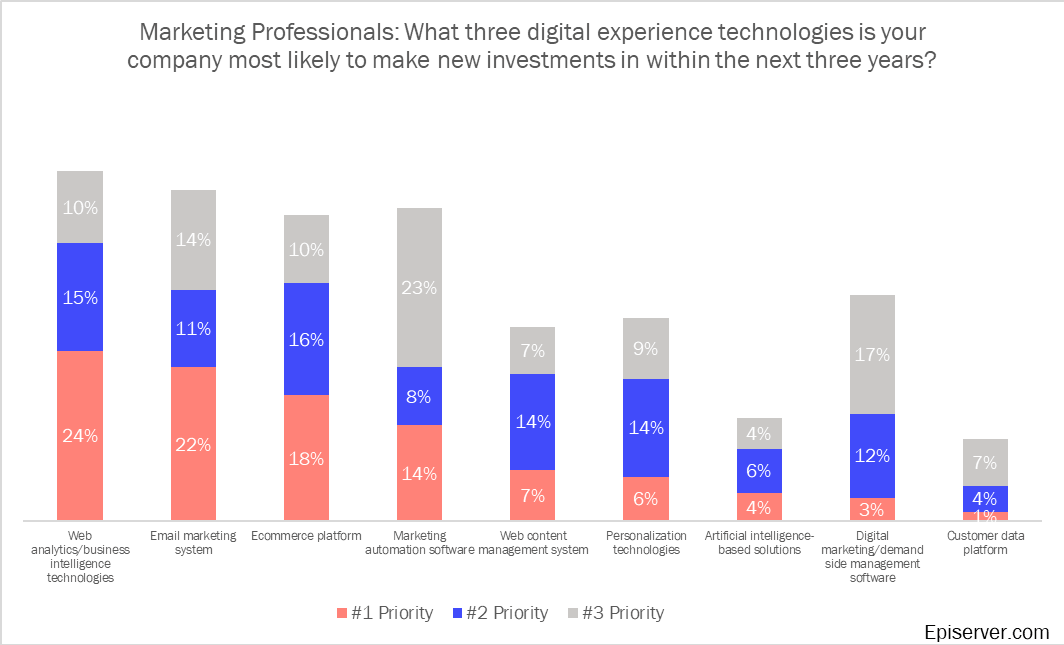
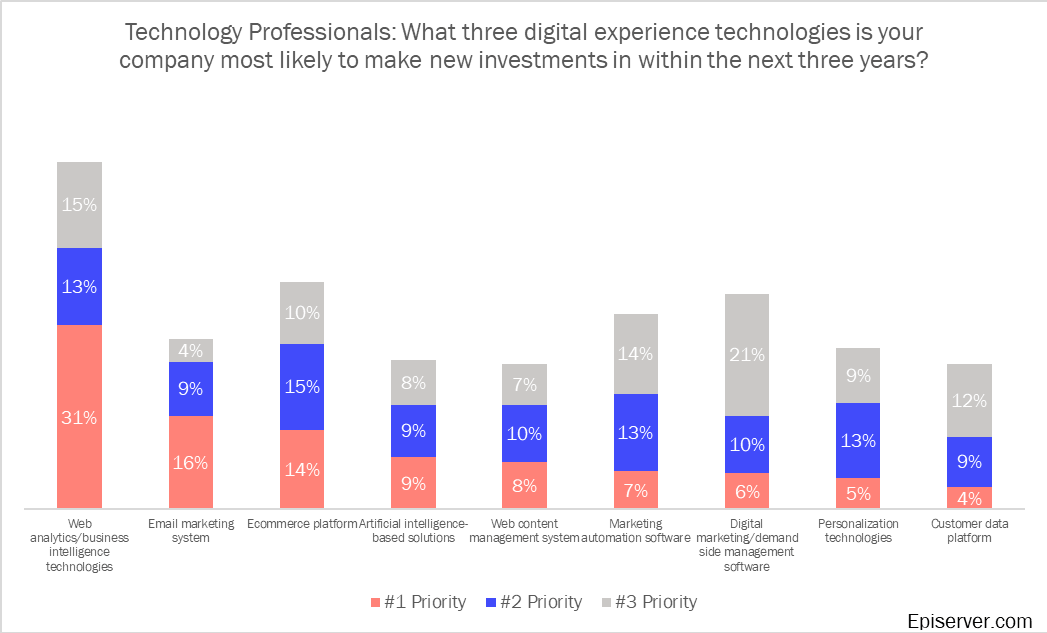
Looking to 2022, will AI have replaced human workers? Most think so; marketers believe AI will replace human workers in marketing functions more than their IT colleagues.
While over 50% of all respondents said they agreed or strongly agreed that AI will be used to replace human workers, marketing professionals were more inclined to agree that AI would replace human workers; 68% either agreed or strongly agreed that AI would replace human workers in marketing roles. Compare that to 59% of technology professionals who agree/strongly agree that AI will replace human workers.
Perhaps marketing professionals are already seeing the use of AI technology replace routine tasks in their jobs more than technology professionals. Or perhaps technology professionals are more skeptical than marketing about the ability for AI to replace a human workforce. Either way, there is broad consensus that AI will be used to replace human workforce in the next three years.
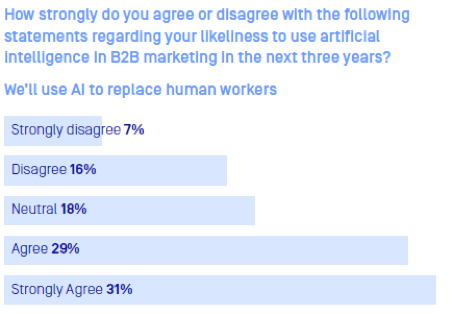
We asked about other uses of AI and most marketing and technology professionals overwhelmingly agree AI will be used to find new leads, personalize experiences, engage with customers, make better decisions, and improve product development.
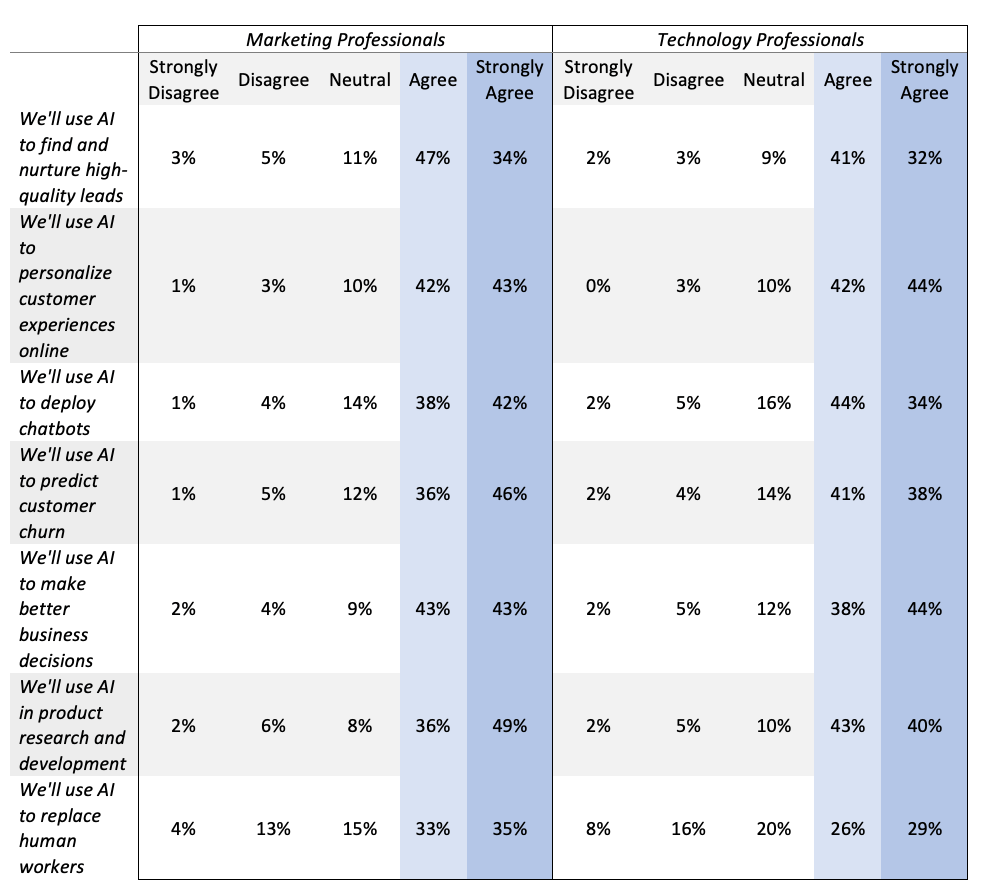
While an organization’s digital experience of today could look completely different tomorrow with the right investments and decisions, understanding how each department views digital transformation is one of the first stops in a rewarding journey.
Download Episerver’s, B2B Digital Experiences Report 2019: How Companies are Meeting Rising Expectations.
Ed Kennedy is the Senior Director of Commerce Strategy at
Episerver. He has spent the last nine years designing and implementing e-commerce platforms for consumer brands, B2B manufacturers and wholesale distributors. In his current role, Ed is responsible for the successful adoption of the Episerver platform by customers.





















